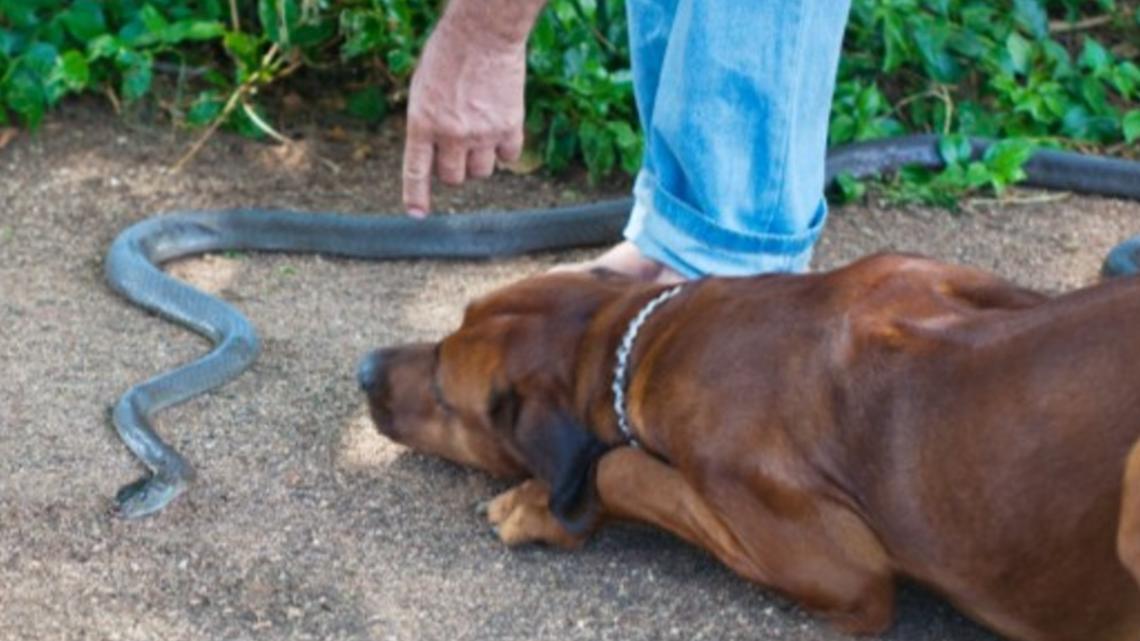
Pet owners are reminded to be aware of snakes, especially venomous ones, while you’re outside enjoying the weather.
SAN ANTONIO — It should be no surprise to anyone who lives in Texas that at some time, somewhere, you or your pet will likely encounter a snake when you’re outside.
But did you know that snake bites are on the rise right now in San Antonio?
One local veterinarian says he’s seen an increase in the number of snakebites this year, with his specialty and emergency hospital seeing up to eight snakebites a week at its peak.
“In the San Antonio area, we can see a wide variety of venomous snakes including copperheads, rattlesnakes, cottonmouths, and coral snakes, with rattlesnake being the most commonly encountered,” says Dr. Hindmarsh at MissionVet Specialty & Emergency. “Pets bitten by venomous snakes often exhibit sudden swelling, bleeding, pain, limping, or weakness. With coral snake envenomation, we also see the development of paralysis leading to subsequent respiratory failure. Snake venom is a complex mixture that contains toxins that can affect all body systems, including the blood/clotting system, brain, heart, lungs, kidneys, and muscles, with the local effects and effects on blood clotting being the most serious and most frequent.”
Pet owners are reminded to be aware of snakes, especially venomous ones, while you’re outside enjoying the weather.
Some signs that your pet might have been bitten include swelling of the face or forelimbs, puncture wounds, bleeding, bruising, vomiting, drooling, difficulty breathing, dilated pupils, and possibly seizures.
“These pets require immediate veterinary attention with a hospital that stocks antivenom. The sooner these pets receive antivenom, the better the outcome,” Dr. Hindmarsh explains.
If your has been bitten by a snake they will need immediate treatment. This includes diagnostic blood panels to investigate for active venom circulating in the bloodstream, clotting profiles, pain medications, intravenous fluids, and antivenom.
What to do if your pet is bit by a snake:
- Stay Calm: Panicking can worsen the situation for both you and your pet.
- Assess the Bite: Determine if it’s a minor or severe bite. Minor bites are often from non-venomous snakes and may only require cleaning.
- For Minor Bites: Clean the wound thoroughly with soap and water, flush with water, and apply pressure to bleeding wounds, according to PetMD.
- For Severe Bites: Seek immediate veterinary care. Keep the pet calm and still, ideally keeping the bite below the heart.
Veterinarians do not recommend any at-home treatments. Experts say they are neither safe or effective when dealing with snake venom.
Common prescription or over-the-counter anti-inflammatory/pain management treatments can even be harmful to your pet.
“If your pet is envenomated, remain calm and avoid the temptation to offer any over-the-counter medications such as NSAIDs (or other OTC pain medications) or Benadryl,” Dr. Hindmarsh says. “While well-intentioned, some OTC medications can actually worsen the outcome and prognosis in snakebite patients or others may not be beneficial at all.”
If your pet has been bitten, you are asked to take them to see their veterinarian so they can be treated right away.
Failing to seek treatment can cause serious complications, including the death of your pet.
